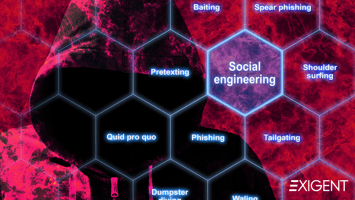If you're among the 66% of business leaders increasingly concerned about cyberattacks in 2023, it's...
Creating a Cybersecurity Culture is Your Best Defense
It's a common theme in our TechWise blogs that security awareness training is absolutely critical when it comes to a comprehensive cybersecurity strategy. Most breaches start with an innocent click of a mouse, making social-engineered attacks such as phishing emails one of the leading causes of data breaches.
Simple human error makes educating your team about cybersecurity a priority. However, for true cybersecurity success, leadership must work closely with a trusted managed services partner (MSP) to build a security culture—wrapping awareness, engagement, and education around tailored managed security solutions to truly protect the organization. The reality is that even the best tools are useless if your organization's culture isn't security-focused.
Key Takeaways
- A strong cybersecurity culture starts with leadership and is sustained through employee training and engagement.
- MSPs play a crucial role in supporting cybersecurity awareness, policy development, and long-term resilience.
- Fostering open communication and rewarding positive behaviors reduces human error and improves cyber risk management.
Cybersecurity as a Business Mindset
So often, the message about cybersecurity strategy revolves around innovative technology and cutting-edge tools, but it misses the mark when it addresses the mindset necessary for true cyber resiliency. Business leaders must champion security initiatives by making cybersecurity a core business value, reinforcing its importance through company-wide communications, and visibly participating in training. When the leadership team leads by example, employees are more likely to take security seriously.
Too many organizations think deep pockets drive better security. While a commitment to investing in the technology stack to protect your business is needed, a cultural investment is required as well.
It takes several steps to launch a cybersecurity culture:
- Teach employees how to recognize potential security risks and how to respond appropriately by scheduling regular, ongoing security awareness training.
- Build on training by creating a security-first safe environment where employees feel comfortable reporting any concerns, issues, or potential mistakes without punishment.
- Establish and enforce clear policies for passwords, data handling, device usage, and incident reporting.
- Encourage teams to discuss security topics in meetings and reinforce positive security behaviors. This promotes the idea that security is a shared effort, not just the job of the IT team.
- Make it clear that no one is above security awareness training—not even top leaders.
- Across the board, reward positive behaviors.
- Continue to discuss, evaluate, and improve training, policies, and tools for reporting.
- Amplify the important role employees play in protecting your business and customer data.
Benefits of Building a Strong Security Culture
Building an organizational focus on security pays clear dividends.
With a successful security culture, you not only reduce cyber risk, you can reduce human error, speed up incident response, and build long-term resilience. When your employees engage with training and understand they are central to keeping the business safe, you will see the power of a security-focused workforce.
Once involved in the process, employees are more likely to spot problems and suggest potential improvements, which leads to true resilience over time. Empowering employees also drives a sense of inclusivity and trust, especially when they realize they can communicate openly about concerns without fear of reprisal. Additionally, as employees better understand security rules, they are much less likely to make use of shadow IT services, resolving a well-hidden vulnerability in many organizations.
Your MSP's Role in Employee Cybersecurity Awareness
A security culture doesn't end with employees. Everyone has a role.
- Organizational leaders model behavior and fully participate in training. Employees are involved in cybersecurity conversations and understand the need to act thoughtfully. MSPs enable the culture by providing security awareness training, offering policy frameworks, and sharing best practices.
- Your MSP should offer support for your security culture in several ways, starting by conducting regular business reviews with your company to stay aligned with concerns, and to review and update your long-term technology plan (not just for cybersecurity).
- An outsourced IT team should also guide the policies you need in place, either offer or recommend security training, and generally serve as a trusted source for information. Plus, a true MSP partner should support your efforts to build a security culture through ongoing coaching, not just technology deployment and monitoring services.
Creating a Cyber Safe Workplace
Too often, organizations are focused on protected data when they think about investing in cybersecurity. But it pays to keep in mind that you are actually protecting your business operations and reputation, your clients, and your employees. By involving your team and making security part of your culture, you empower your team to play a crucial role in defending their workplace, customers, and themselves. Security should be as important to your business culture as core values and your mission statement. If you aren't sure where to start, here are our recommended next steps:
- Download our new ebook on the shared responsibility of cybersecurity
- Ask Exigent about launching security awareness training


.png?height=200&name=shadow%20IT%20(2).png)